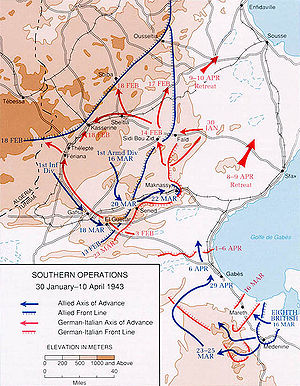Wadi Akarit
| Battle of Wadi Akarit | |||||||
|---|---|---|---|---|---|---|---|
| Part of the Tunisia Campaign of the Second World War | |||||||
 Gabès and the Tunisian Campaign. |
|||||||
|
|||||||
| Belligerents | |||||||
|
|
|
||||||
| Commanders and leaders | |||||||
|
|
|
||||||
| Strength | |||||||
| 3 divisions | 24,500 (estimated) | ||||||
| Casualties and losses | |||||||
| 1,289 killed, wounded or missing 32 tanks |
7,000 prisoners | ||||||
The Battle of Wadi Akarit (Operation Scipio) was an Allied attack from 6–7 April 1943, to dislodge Axis forces from positions along the Wadi Akarit in Tunisia (also known as the Akarit Line) during the Tunisia Campaign of the Second World War. The Gabès Gap, north of the towns of Gabès and El Hamma, is a passage between the sea and impassable salt marshes. The 51st (Highland) Infantry Division breached the defences and held a bridgehead, allowing the passage of their main force to roll up the Axis defences. After several determined counter-attacks, the Axis forces withdrew and the Eighth Army, under General Bernard Montgomery, pursued toward Tunis, until reaching Axis defensive positions at Enfidaville.
After the Mareth Line in southern Tunisia had been outflanked in Operation Supercharge II, through the Tebaga Gap, Axis forces had withdrawn to the Wadi Akarit, north of Gabès. This position had been identified long before by Erwin Rommel as a good defensive position with secure flanks and a short supply route to Sicily. Rommel had wanted to withdraw there after the Second Battle of El Alamein, as it was the best place to resist the Eighth Army and prolong the Axis presence in Africa. With the British held at Wadi Akarit, all available troops in Tunisia could repulse the First Army (nominally British but with American and French units under command) to the west, before dealing a similar blow to Montgomery. The Gabès Gap was the last readily defensible position before the Eighth Army reached Sfax and formed a continuous front with the First Army advancing from the west.
...
Wikipedia
